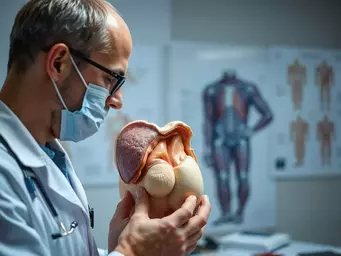Recognizing Symptoms
Early detection is crucial. Key indicators include persistent fatigue, mood fluctuations, decreased libido, and hot flashes.
- Fatigue not relieved by rest
- Mood swings, irritability
Starting your journey with hormone replacement therapy (HRT) can feel overwhelming. Have you considered the profound impact that addressing hormone imbalances might have on your life? Understanding the nuances of hypogonadism and HRT can empower you to make informed choices for your health and well-being.
This visual outlines the crucial steps and important considerations for women navigating hypogonadism and hormone replacement therapy (HRT), from initial recognition to ongoing management.
Early detection is crucial. Key indicators include persistent fatigue, mood fluctuations, decreased libido, and hot flashes.
The initial phase involves baseline tests, medical history review, and selecting the right administration route.
Regular check-ins, monitoring side effects, and follow-up appointments are vital for optimal outcomes.
Understanding coverage options, prior authorizations, and patient assistance programs can ease concerns.
As an endocrinologist, I often see patients struggling with the intricacies of hormone health. One common condition is hypogonadism, which can significantly affect a woman's quality of life. Understanding hormone replacement therapy (HRT) is essential for those experiencing symptoms of this condition, as it can offer a pathway to restore balance and vitality.
At Hypogonadal Health, we aim to demystify these medical concepts. Let's dive into what hypogonadism means and how HRT can play a crucial role in treatment.
Hypogonadism occurs when the body fails to produce sufficient sex hormones, primarily estrogen and progesterone in women. This deficiency can stem from various factors, including genetic issues, medical conditions, and even lifestyle choices. Recognizing the early signs is key to seeking appropriate treatment! For a deeper dive into the definition and diagnosis of hypogonadism, you can refer to authoritative medical resources such as the National Center for Biotechnology Information (NCBI).
If you're noticing one or more of these symptoms, it's crucial to consult with a healthcare professional. They can help identify whether hypogonadism is at play and discuss potential treatment options with you.
Hormone replacement therapy aims to replenish the hormones your body lacks. For women with hypogonadism, this typically involves administering estrogen and progesterone, either separately or in combination. The goal is to alleviate symptoms while maintaining hormonal balance. The North American Menopause Society (NAMS) provides comprehensive information on hormone therapy options and their benefits.
There are various forms of HRT available, which we will explore further in this article. However, it's important to understand that the therapy's effectiveness can vary based on individual health profiles, making personalized treatment essential. Have you considered what form might suit you best?
Understanding the symptoms of hypogonadism is the first step toward effective treatment. Many women experience fatigue, mood swings, and other challenges that can impact daily life. Acknowledging these signs allows for timely action, which can lead to improved health outcomes.
Recognizing these symptoms can empower you to take charge of your health. If you suspect you might be experiencing hypogonadism, I encourage you to reach out to your healthcare provider. They can conduct tests and discuss potential treatment paths available to you.
Have you ever wondered about the long-term effects of hormone replacement therapy? It's a topic worth discussing! Share your thoughts below:
As we wrap up our exploration of hormone replacement therapy (HRT) for women with hypogonadism, it's essential to highlight some key points. Starting HRT can be a transformative experience, but it’s crucial to approach it with understanding and preparation. Whether you're considering it or have already begun the journey, knowing what to expect can make all the difference!
The journey of HRT is not just about alleviating symptoms but also about enhancing your overall quality of life. By staying informed and proactive, you can ensure your treatment aligns with your personal health goals.
Beginning hormone replacement therapy can feel like stepping into unknown territory. To guide you through this process, here’s a brief overview of what to anticipate:
Remember, each person’s experience with HRT is unique, and it may take time to find the optimal regimen. Don't hesitate to ask questions—your health is worth it!
Understanding the financial aspects of hormone replacement therapy is crucial for effective management. Many patients worry about the costs associated with HRT, but there are resources available to help mitigate these concerns. Here are some steps you can take:
Being informed empowers you to make choices that best suit your financial situation while ensuring you receive the care you need. At Hypogonadal Health, we encourage patients to advocate for their treatment and explore all options available.
Hypogonadism in women is a condition where the ovaries produce insufficient sex hormones, primarily estrogen and progesterone. This deficiency can lead to various symptoms like fatigue, mood swings, decreased libido, and hot flashes.
HRT is a medical treatment designed to replenish hormones that the body lacks. For women with hypogonadism, HRT typically involves administering estrogen and progesterone to alleviate symptoms and restore hormonal balance.
Common symptoms include persistent fatigue not relieved by rest, mood fluctuations, irritability, decreased libido or sexual dysfunction, hot flashes, night sweats, difficulty concentrating, and potential weight changes.
When starting HRT, you can expect initial hormone tests to establish baseline levels, a thorough review of your medical history, discussion of various administration methods (oral, transdermal, etc.), and regular check-ins with your healthcare provider to monitor your response and make adjustments.
To manage HRT costs, contact your insurance provider to understand coverage, inquire about prior authorizations, discuss generic medication options with your doctor, and explore patient assistance programs that may offer financial support.
Finding the right pathway in your hormone health journey is essential, and discussing your options with healthcare professionals is a critical next step. Hypogonadal Health is here to support you as you navigate this process!
Establishing a solid relationship with your healthcare team is vital in managing hypogonadism effectively. Here’s how to make the most of your visits:
By fostering open communication, you can ensure that your treatment plan is tailored to your unique needs and preferences.
Educating yourself is key to managing your health effectively. There are numerous resources available to help you understand hypogonadism and HRT better:
These resources can provide further clarity and support as you navigate your journey.
Knowledge is power! Understanding your treatment protocols and options can help you feel more confident in managing your health. Here’s what I suggest:
By equipping yourself with knowledge, you can take an active role in your hormonal health and make informed decisions that align with your wellness goals!
Here is a quick recap of the important points discussed in the article:



 What if the key to unlocking your vitality lies in understanding the hormones that influence your bo
What if the key to unlocking your vitality lies in understanding the hormones that influence your bo
 Recognizing that your environment can significantly influence your hormonal health is crucial. Have
Recognizing that your environment can significantly influence your hormonal health is crucial. Have
 Have you considered how fluctuations in your testosterone levels might affect your daily energy and
Have you considered how fluctuations in your testosterone levels might affect your daily energy and
 Trauma to the testicles can have profound effects on hormonal health, but understanding the causes a
Trauma to the testicles can have profound effects on hormonal health, but understanding the causes a